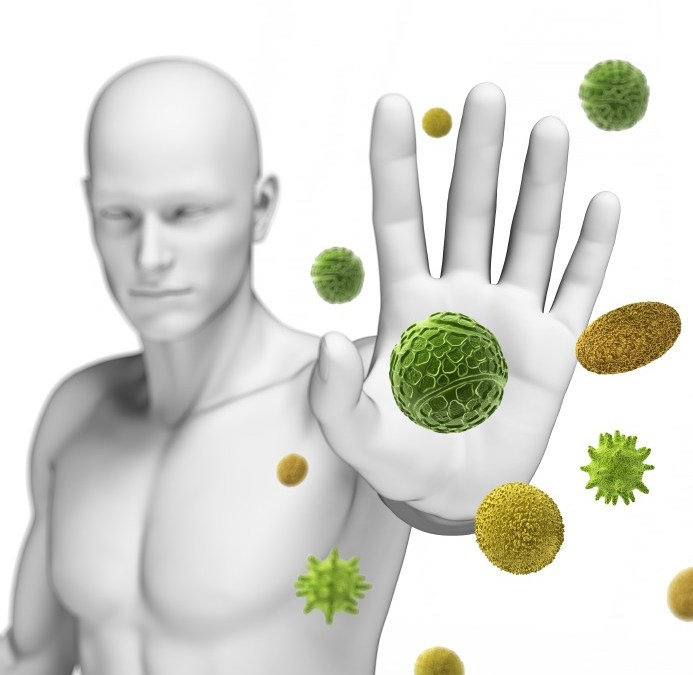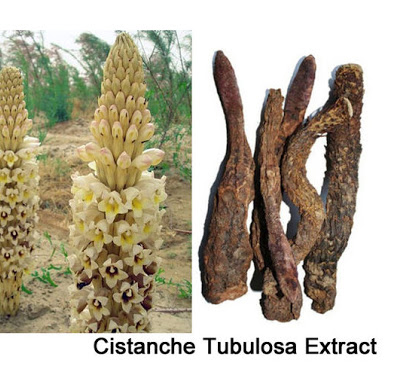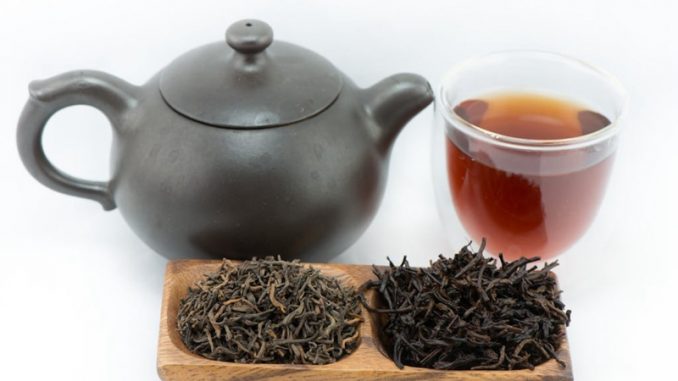Immune Health: Cistanche And Pu-erh Tea Supplements Could Help Improve Immune Factors And Reduce Pro-inflammatory Cytokines Such As Interleukin-6
Source: Immune Health Jun 09, 2020 5 years, 8 months, 1 week, 5 days, 13 hours, 44 minutes ago
Immune Health: As we age, our immune functions become dysfunctional or senescent while at the same time Influenza viruses and the SARS-CoV-2 coronavirus can wreak havoc on our bodies when we get infected especially with the body’s response of producing pro-inflammatory cytokines such as interleukin-6 (iL-6).

Medical research has since moved forward on several fronts to induce systemic improvements in immune functions including the usage of standardized botanicals that have been shown to improve protective immune factors while reducing pro-inflammatory cytokines such as interleukin-6 (IL-6).This article discusses two such botanical supplements: Cistanche (a
holoparasitic desert plant that lacks chlorophyll and is from the family Orobanchaceae) and Pu-erh Tea, a type of fermented black tea from Yunnan province , China.
Typically around the age of 50, most humans experiences startling changes that decimates our ability to combat infections and malignancies.
Certain individuals encounter these immune impairments earlier in life.
These events in our bodies decreases naïve T cells needed to ward off new bacteria, viruses, and cancers.
A naive T cell (T
h0 cell) is a T cell that has differentiated in bone marrow, and successfully undergone the positive and negative processes of central selection in the thymus. Among these are the naive forms of helper T cells (CD4+) and cytotoxic T cells (CD8+).
While the naïve T cells are lost, we accumulate senile memory T cells that emit pro-inflammatory signals that wreak havoc in every organ system.
https://onlinelibrary.wiley.com/doi/epdf/10.1046/j.1365-2567.2002.01447.x
One major lethal inflammatory “signals” is a cytokine called interleukin-6 (IL-6).
https://www.sciencedirect.com/science/article/pii/S0167488911000425
Past studies have shown that higher IL-6 levels are associated with a 2-fold greater risk of death. Higher levels are also involved with multiple degenerative processes, including frailty, from which so many elderly suffer.
https://www.amjmed.com/article/S0002-9343(99)00066-2/pdf and
https://pubmed.ncbi.nlm.nih.gov/19438806/ and
https://pubmed.ncbi.nlm.nih.gov/10774463/ and
https://pubmed.ncbi.nlm.nih.gov/16799139/
Interestingly, a common trait of healthy centenarians is that they have unusually low levels of IL-6.
https://pubmed.ncbi.nlm.nih.gov/15621218/
/>
Most individuals typically associate immune senescence with weakened immune function. It turns out that impaired immunity is only half the problem. Spiraling levels of IL-6 that attack our healthy tissues are another component of immune senescence that must be addressed.
https://pubmed.ncbi.nlm.nih.gov/23664267/
With the potential coming of a second bigger COVID-19 wave and the impending Influenza season, there is an urgent need today to accelerate restoration of immune competence in aging humans, including suppressing deadly interleukin-6 levels.
It has been observed that immune senescence is a leading cause of disability and infectious death in aging humans.
https://pubmed.ncbi.nlm.nih.gov/22633440/
For example deaths from
pneumonia are rare in youth, but spiral upward as humans mature. If you read obituaries (as I do), the number of once-vigorous individuals who perish from opportunistic illnesses caused by
immune senescence is startling.
https://pubmed.ncbi.nlm.nih.gov/21615674/
Significantly, in people over age 65, the top 10 causes of death include influenza, pneumonia, and sepsis.
Immune senescence is a major cause of all these maladies.
https://pubmed.ncbi.nlm.nih.gov/23982440/ and
https://pubmed.ncbi.nlm.nih.gov/21980502/ and
https://pubmed.ncbi.nlm.nih.gov/24478442/ and
https://pubmed.ncbi.nlm.nih.gov/21353149/ and
https://pubmed.ncbi.nlm.nih.gov/16237654/ and
https://pubmed.ncbi.nlm.nih.gov/12392279/
It is well known that Cancer, stroke, Alzheimer’s, and heart attack are common diseases of aging. These illnesses are all also related to
immune senescence.
A past research
concluded that chronic heart failure is more common in patients showing a higher degree of immunosenescence than age-matched healthy controls. T-lymphocyte differentiation and IL-6 levels are increased in patients with an advanced clinical status and may contribute to disease impairment through a compromised adaptive immune response due to accelerated aging of their immune system. https://pubmed.ncbi.nlm.nih.gov/24801091/
Often we hear the term “
immune health” as people seek to protect against winter
viral infections. The public does not yet understand what causes our immune system to fail as we age and also the importance to have more Naïve T Cells to maintain immune balance.
Immune imbalance occurs when our aging immune system fails to protect against new cancers/infections and instead generates inflammatory reactions (including increased IL-6) that attack every cell in our body.
Typically a “naïve” immune cell is one that has not yet been activated. Since it is “naïve” (not yet exposed to an antigen), naïve immune cells are primed to effectively respond to new infectious agents and malignancies. Once exposed, naïve immune cells become memory cells or plasma cells specific to the original antigen. As our internal reservoir of naïve immune cells is decreased, we have less ability to respond to new infections/malignancies.
https://www.ncbi.nlm.nih.gov/books/NBK27090/
A deficit of naïve immune cells combined with overaccumulation of exhausted memory cells decreases the efficacy (antibody response) of vaccinations.
https://pubmed.ncbi.nlm.nih.gov/18444828/
Exhausted memory T cells are associated with increased risks of coronary heart disease and endothelial dysfunction, along with systemic inflammation.
https://pubmed.ncbi.nlm.nih.gov/23390638/ and
https://pubmed.ncbi.nlm.nih.gov/11827921/ and
https://pubmed.ncbi.nlm.nih.gov/24203779/ and
https://pubmed.ncbi.nlm.nih.gov/24009662/ and
https://pubmed.ncbi.nlm.nih.gov/18818214/
If one is to guard against the ravages of immune senescence, one needs to increase the numbers of naïve cells (“virgin” immune cells), while reducing numbers of senile memory cells.
Improving Immune Factors Using Cistanche

Interestingly, the herb Cistanche helps combat immune senescence, which appears to have rejuvenating effects on bone marrow. Supplementation with Cistanche has been shown to increase naïve T cells and natural killer (NK) cells while decreasing memory T cells and pro-inflammatory IL-6 while protecting against Immune Senescence
This herbal plant has been used extensively in China to treat the “ailments of aging.”
https://pubmed.ncbi.nlm.nih.gov/18691718/
It has been observed that supplementation with Cistanche has been shown to increase naïve T cells and natural killer (NK) cells while decreasing memory T cells and pro-inflammatory interleukin-6.
https://pubmed.ncbi.nlm.nih.gov/24523825/
A prime cause of the severe immune dysfunction suffered by the elderly is a marked decrease in naïve T cells and functional natural killer cells, with a concomitant increase in memory T cells.
https://pubmed.ncbi.nlm.nih.gov/16803980/ and
https://pubmed.ncbi.nlm.nih.gov/20700658/ and
https://pubmed.ncbi.nlm.nih.gov/23251076/ and
https://pubmed.ncbi.nlm.nih.gov/23660515/ and
https://pubmed.ncbi.nlm.nih.gov/16141244/
It has been found that Cistanche counteracts these pathological trends that characterize immune senescence.
https://pubmed.ncbi.nlm.nih.gov/24523825/
It has been shown that Cistanche helps restore progenitors of peripheral naïve T cells, which explains the increase seen in these vital immune cells in response to Cistanche. Animals supplemented with Cistanche have increased lifespans, which would be expected from a compound that counteracts immune senescence.
The plant Cistanche is one of the most popular Chinese herbal medicines and is listed in the Chinese herbal pharmacopeias as having “anti-aging” properties. One reason Chinese physicians see such impressive therapeutic results is that Cistanche restores one of the most prominent bone marrow biomarkers of immune cell formation called stem cell antigen-1.
Typically senile bone marrow loses its ability to produce fresh, naïve immune cells, which are launched into the bloodstream to differentiate into mature naïve T and natural killer cells. Bone marrow stem cell antigen-1 represents the body’s main source of naïve T cells in the blood.
Cistanche appears to have a rejuvenating effect on the bone marrow, something that is generally available only through expensive recombinant drugs.
https://pubmed.ncbi.nlm.nih.gov/23232713/ and
https://pubmed.ncbi.nlm.nih.gov/20860137/
The beneficial impact of Cistanche was demonstrated in an open-label, pilot trial of elderly people. This study combined a low dose of Cistanche (100 mg) with zinc, vitamin E, vitamin B6, fucoidan, and coenzyme Q10. Not only were markers of immune senescence reversed, but the test subjects reported improvements in quality of life, such as not “feeling tired all the time.”
https://www.jstage.jst.go.jp/article/jaam/8/2/8_2_7/_article
Such results make sense in light of the multiple adverse effects immune senescence inflicts on the body, which include increased levels of frailty.
https://pubmed.ncbi.nlm.nih.gov/15489064/
In addition to T cells and natural killer cells,
Cistanche also helps activate other important immune cells, including macrophages, dendritic cells, and B cells.42,43
https://pubmed.ncbi.nlm.nih.gov/29271162/ and
https://journals.plos.org/plosone/article/file?id=10.1371/journal.pone.0191356&type=printable
Cistanche represents an opportunity to restore vital components of our aging immune systems. Its low cost makes it readily affordable.
Suppressing Interleukin-6 (IL-6) And Its Lethal Impact With Pu-erh Tea
( A Type Of Fermented Tea)

Pu-erh Tea
A simple way of describing “aging” is that beneficial factors (such as naïve T cell production) decrease while detrimental ones (like interleukin-6) increase.
Interleukin-6 levels are especially high in patients with autoimmune conditions in which an out-of-control immune system attacks one’s own tissues. High-serum IL-6, as seen in rheumatoid arthritis, for instance, is regarded as a reliable biomarker of high-grade inflammation.
https://pubmed.ncbi.nlm.nih.gov/12220549/ and
https://pubmed.ncbi.nlm.nih.gov/24076269/ and
https://pubmed.ncbi.nlm.nih.gov/19109195/
It is known that when it comes to “normal” aging, elevated
IL-6 contributes to the destruction of bone, heart valves, neurons, and other tissues.The DNA damage that IL-6 inflicts accelerates aging processes and malignant transformation of healthy cells.
https://pubmed.ncbi.nlm.nih.gov/19597488/ and
https://pubmed.ncbi.nlm.nih.gov/20444648/ and
https://pubmed.ncbi.nlm.nih.gov/15051507/ and
https://pubmed.ncbi.nlm.nih.gov/23104848/ and
https://pubmed.ncbi.nlm.nih.gov/26065007/
There is a critical need for aging humans to suppress chronic inflammatory inducers like interleukin-6.
It has been shown that Pu-erh Tea, a type of fermented tea from Yunnan - China has demonstrated the ability to reduce IL-6.
In a randomized clinical trial, when this tea extract by itself was given to 90 patients (30-65 years old) with metabolic syndrome, the following reductions in inflammatory markers were observed:
https://pubmed.ncbi.nlm.nih.gov/21725873/
-C-reactive protein (CRP) was reduced by 26%
-Tumor necrosis factor (TNF-a) was reduced by 23%
-Interleukin-6 (IL-6) was reduced by 21%
These reductions indicate significant decreases in overall pro-inflammatory status.
This research also found a 34% increase of inflammation-quelling IL-10, which further demonstrates the overall reduction in inflammation possible with Pu-erh tea extract.
Pu-erh tea extract offers multiple pathways to potentially prevent progress of immune senescence.
Furthermore in addition to suppressing IL-6 and other inflammatory factors, this tea extract was shown to favorably alter genes (such as mutant p53) involved in tumor cell growth.
https://pubmed.ncbi.nlm.nih.gov/22174618/
Research show that Pu-erh tea and its extract combat immune senescence by multiple mechanisms Two of the chief ones include increasing natural killer and T cells.
https://www.researchgate.net/publication/236661964_Recent_advances_on_the_beneficial_use_and_health_implications_of_Pu-Erh_te
In addition to its ability to bolster the immune system itself, Pu-erh tea appears to provide direct antibacterial and antiviral effects as well. Several studies have demonstrated that Pu-erh tea directly kills or inhibits the growth of bacteria and suppresses the growth of viruses such as hepatitis B.
https://europepmc.org/article/agr/ind601125802
Individuals today have access to an arsenal of cheap novel compounds to help counteract the underlying factors that characterize immune senescence.
A wide and impressive array of clinical research is being investigated to induce systemic age reversal in elderly people, including restoration of youthful immune function.
The carnage inflicted by dysfunctional immunity in the elderly especially during influenza epidemics and the current COVID-19 crisis mandates that research accelerate faster, so that more lives can be saved.
For more on
Immune Health, keep on logging to Thailand Medical News.


